#tools for ME/CFS
Explore tagged Tumblr posts
Text
Pacing 101
I really want to try and talk through some of the first stages of learning to pace because it’s not as simple as just saying “go off and do it” (as you possibly know and I am surely learning). As per my last post, I’m using two powerful aids to help me master this: the book Classic Pacing for a Better Life with ME – Ingebjørg Midsem Dahl and the Visible app, both of which I highly recommend as…
#ADHD#articles#chronic fatigue#chronic health conditions#healing rest#learning how to pace effectively#long covid#ME/CFS#pacing#post viral syndrome#rest and recovery#stabilising a flare-up#stabilising ME/CFS#tools for ME/CFS#Visible App
1 note
·
View note
Text
whenever i see someone on this site summarising a scientific article that is itself summarising a paper especially if that paper is about anything pharma/medicine i feel a great sense of impending doom. not that i don't trust randomers on the piss on the poor website but i always go and fact check against the actual paper and not once has someone summarising an article thats summarising a paper ever been like. right.
#the temptation to start a 'scientific misinformation' sideblog where people can just send me things people write to fact check#the one i just saw was a diagnostic tool for CFS and the person summarising was like THEY CAN DIAGNOSE IT NOW THEYRE TESTING DRUGS USING IT#1. no 2. no#diagnosis is a tricky beast and the more you know about biomarkers the more it becomes ???????????#and literally nowhere in the article or the paper did it say they were testing drugs using it#it said 'we hope to repurpose this so it can be used as a tool to measure drug efficacy'#anyway. dont trust people to communicate science effectively here#the articles are usually pretty good but the tumblrised summaries are not. im gonna become a one-person community notes just for science
4 notes
·
View notes
Text
bought myself a knockoff python water changer for aquarium maintenance btw. 100% worth the 40 dollars so far
#.pdf#rd#ive always been the “why would i waste money on stuff like that when i can use the cheap siphon i already have and buckets” type#but since developing me/cfs the amount of energy it takes to carry the filled buckets around is too much and makes me crash#and i know im too stubborn to give up my tanks so i got the fancy water changer. considering it a sort of accessibility tool i guess#i just wish i had like a really tall adjustable rolling stool or something so i could work on my tanks without having to stay standing#sadly i cant find any that can go tall enough to let me do things i can do standing. i just want a seat thats at hip height come onnnn
1 note
·
View note
Text
How Modern Technology Supports Life with Chronic Illness: Amazon, YouTube & Essential Tools
Discover how Amazon, YouTube, and digital tools bring connection, learning, and convenience to those managing Chronic Fatigue Syndrome (ME/CFS) and other chronic conditions. Living with Chronic Fatigue Syndrome (ME/CFS) is like existing within the quiet spaces between life’s rhythms. The world continues to spin, time flows forward, but for those of us confined by fatigue, much of life happens…
#ai#Amazon#ChatGPT#chronic fatigue solutions#chronic fatigue syndrome#chronic illness#eBay#Facebook#Gmail#Google#Google Maps for chronic illness#Google Translate#health#Home Depot#homebound life with chronic illness#ME/CFS#modern tools for chronic illness#post-viral illness#radar apps for weather#Samsung A51#sensory overload management#tech for energy conservation#Velcro setup for bedridden#Walmart#Weather#weather app for chronic illness#Wordle#YouTube#YouTube documentaries
0 notes
Text
I found an extremely dope disability survival guide for those who are homebound, bedbound, in need of disability accommodations, or would otherwise like resources for how to manage your life as a disabled person. (Link is safe)
It has some great articles and resources and while written by people with ME/CFS, it keeps all disabilities in mind. A lot of it is specific to the USA but even if you're from somewhere else, there are many guides that can still help you. Some really good ones are:
How to live a great disabled life- A guide full of resources to make your life easier and probably the best place to start (including links to some of the below resources). Everything from applying for good quality affordable housing to getting free transportation, affordable medication, how to get enough food stamps, how to get a free phone that doesn't suck, how to find housemates and caregivers, how to be homebound, support groups and Facebook pages (including for specific illnesses), how to help with social change from home, and so many more.
Turning a "no" into a "yes"- A guide on what to say when denied for disability aid/accommodations of many types, particularly over the phone. "Never take no for an answer over the phone. If you have not been turned down in writing, you have not been turned down. Period."
How to be poor in America- A very expansive and helpful guide including things from a directory to find your nearest food bank to resources for getting free home modifications, how to get cheap or free eye and dental care, extremely cheap internet, and financial assistance with vet bills
How to be homebound- This is pretty helpful even if you're not homebound. It includes guides on how to save spoons, getting free and low cost transportation, disability resources in your area, home meals, how to have fun/keep busy while in bed, and a severe bedbound activity master list which includes a link to an audio version of the list on Soundcloud
Master List of Disability Accommodation Letters For Housing- Guides on how to request accommodations and housing as well as your rights, laws, and prewritten sample letters to help you get whatever you need. Includes information on how to request additional bedrooms, stop evictions, request meetings via phone, mail, and email if you can't in person, what you can do if a request is denied, and many other helpful guides
Special Laws to Help Domestic Violence Survivors (Vouchers & Low Income Housing)- Protections, laws, and housing rights for survivors of DV (any gender), and how to get support and protection under the VAWA laws to help you and/or loved ones receive housing and assistance
Dealing With Debt & Disability- Information to assist with debt including student loans, medical debt, how to deal with debt collectors as well as an article with a step by step guide that helped the author cut her overwhelming medical bills by 80%!
There are so many more articles, guides, and tools here that have helped a lot of people. And there are a lot of rights, resources, and protections that people don't know they have and guides that can help you manage your life as a disabled person regardless of income, energy levels, and other factors.
Please boost!
#signal boost#please reblog#I'm so so glad this has gotten the traction that it has!#chronic pain#chronic illness#disability#fibromyalgia#cfs#chronic fаtiguе ѕуndrоmе#actually disabled#spoonie#me/cfs#cfs/me#long covid#important#invisible disability#ehlers danlos syndrome#lyme disease#chronically ill#cpunk#cripplepunk#it's a bummer that it's so US centric but if you're outside of the US you can look into similar programs#I hope that other countries have options like these#the US seems so behind when it comes to medical care and disability resources. and i mean it is#but it's good to know all of your rights as a disabled person or if you ever become disabled
24K notes
·
View notes
Note
can you explain family abolition in a few words?
sure. there is no one unitary 'family abolitionist' perspective so be aware that i'm explaining this as a marxist and not as an anarchist or a radical feminist.
basically, "the family" is a social construct rather than a fixed self-evident truth. the family has been created and can be shaped, altered, or--indeed--abolished. this is evinced by the broad anthropological and historical record of radical transformations in what constitutes 'the family' (cf. clans, the extended family, the nuclear family). viewing the family as such opens it up to critique and also to the concept that it could be replaced with something better (in much the same way that, for communist and anarchist, refusing to accept the timelessness / naturalization of the bourgeois state opens up new horizons of political thought outside of engagement with electoral politics.)
among these critiques of the family are:
that it is a tool of patriarchal control over women and children by creating an economic dependence upon spouses / parents
ergo, that it enables and causes 'abuse' -- that child abuse, spousal abuse, and intimate partner violence are not abberations of 'the family' but in fact a natural consequence of its base premises re: power and control
that it serves as a site of invisiblised economic labour (e.g. housework)
that it is a tool of the capitalist (formerly the feudal) economy's reproduction of inequality via e.g. inheritance laws
that it serves as a site of normalization and reproduction of hegemonic ideology--i.e. that it is the site where heteronormativity, cisnormativity, gender roles, class positionality, & more are ingrained in children
among solutions family abolitionists propose to remedy it are:
the total dissolution of any legal privilege conferred by romantic or blood relationship in favour of total freedom for any group of people to form a household and cohabitate
the recognition of housework, the work of childrearing, & the general tasks of social reproduction as 'real' labour to be distributed fairly and not according to formal or informal (feminized) hierarchies
the economic and legal freedom of children--(i.e., allowing children unconditional access to food and shelter outside 'the family', allowing children the legal right to informed consent and self-determination)
similarly, the emancipation of women from economic dependence on their partners--both of these can only really be achieved via socialism (as marx put it, 'women in the workplace' only trade patriarchal dependence upon a husband for patriarchal dependence upon an employer)
communal caretaking of children, the sick, & the elderly
yeah. i know. this is a lot of words. its not few words. sorry. it's a complex topic innit. this is a few words For Me consideri ng that i've got a long-ass google doc open where i'm writing up a whole damn essay on this exact topic.
tldr: the family is not inevitable, it is constructed & can be replaced with something better. full economic freedom from dependence on interpersonal familial relationships for everybody now. check out cuba's 2022 family code for an idea of what this could look like as practical legislation.
3K notes
·
View notes
Text
Checkmate ♚
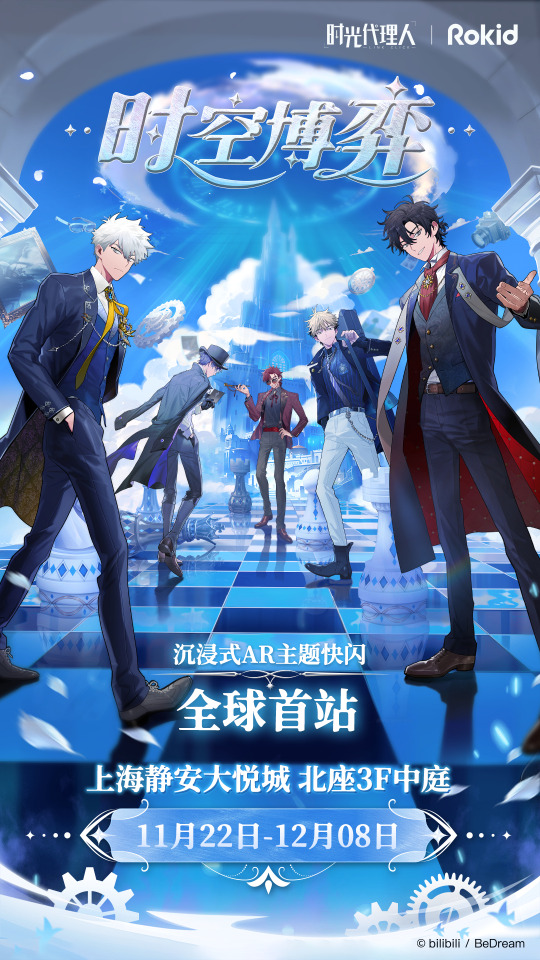
Apparently a temporary AR (Otome) game is coming soon and the artwork for it is just breathtaking! It is also full of details I want to explore OF COURSE. My brain is doing tetris things again, oops.
Looking for a senseless meta about chess pieces? You're in the right place, come on in~
>> Chess Theme
White vs Black
The first topic is obviously the chess theme. Of course, this part is to be taken with a grain of salt since the pieces aren't correctly disposed on the board. However, the characters themselves are walking on their respective squares except for Vein (because he's all powerful and he's above your stupid rules. Probably). Notably, Liu Xiao himself seems to be leaving a white square. And if there is any meaning to it, I'd like to believe it makes a gray character out of him.
Now, what can we say about the chess pieces themselves?
White: rook, pawn, knight
Black: rook, mystery piece, king
Each character is paired with a chess piece.
The most reassuring clue to me is that a white piece has been given to Xia Fei. Which, there is a fat chance this makes an ally out of him. He might be only a Pawn ♙ for now. For those who are not familiar with chess, a Pawn can only move ahead, never back, one square at a time. It has some cool moves too but it depends on the game you want to play. If the path is open, a Pawn can reach the other side of the board, turning it into a Queen ♕. If a Pawn can only move ahead in small range, a Queen literally rules over the whole board. She's quick, vicious and dangerous once she has enough space to move as she pleases. Of course, he can also be a mere Pawn, a tool to manipulate Lu Guang and Cheng Xiaoshi.
[Edit: since I always turn mine into Queens because I like to inspire fear and admiration from my brother, a Pawn can also turn into a Rook, a Bishop, or a Knight. I like to think of Xia Fei as a Queen but it's very interesting that he could turn into either Vein/CXS, Liu Xiao or Lu Guang by the end of Yingdu Chapter. ]
Cheng Xiaoshi and Vein both getting paired with a ♖ Rook ♜ could mean they use the same kind of power or are equivalent in some ways. Rooks have a large range, can move horizontally and vertically, ahead or back. They are better used when paired with other pieces, though, cause a lonely Rook ♖ is an easy pray. I think the main focus here is the similarity more than the piece itself. Lu Guang seems to be the one being punished and haunted, but Vein probably offered his power to Cheng Xiaoshi (or Lu Guang, according to the last Yingdu Chapter PV). My personal theory is that Vein mirrors or shadows Cheng Xiaoshi's shape because he is the source of his power. Vein's position, if there is any relevance to it, keeps Lu Guang's Knight ♘ from moving at the center, his natural and most efficient position.
Toppled King
Liu Xiao has two pieces by his side, a King ♔ and a mystery piece. The merch revealed the later to be a Bishop ♝.
Note that only amateurs tend to topple the King. It is regarded as some kind of pop culture-only approach to chess. Because of this, let's take a look a what an actual checkmate is (where we don't get to step on the vainquished).
Checkmate is any game position in chess in which a player's king is threatened with capture and there is no possible escape. In chess, the king is never actually captured. Checkmating the opponent wins the game. The player loses as soon as their king is checkmated. In formal games, it is usually considered good etiquette to resign an inevitably lost game before being checkmated. (cf. wikipedia)
If Vein, the current character we might recognize as the ultimate villain of the season, is only a Rook ♜, equivalent to Cheng Xiaoshi, who does the King ♔ represent? My personal opinion is Time, Fate itself. The song "Mastermind" supports this theory, and Lu Guang himself really is defying the natural order to save Cheng Xiaoshi, after all. It would make perfect sense. Stopping the clocks at a tournament is the sign of surrender. So basically, the game is over when one gives up and stops when the King has nowhere to go.
The character of Liu Xiao is given a lot of care in this specific artwork. He actually always stood out, since his very first appearance in the season 2 artworks, walking past Lu Guang and Cheng Xiaoshi's portrait, looking away from us. Here, again, he's not interested in the audience, focuses on the photograph of what fans reckon as Lu Guang from "Dive Back in Time".
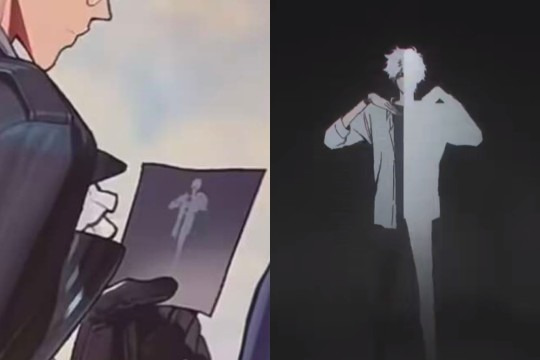
The truth is, he's playing the long game, he has no time to spare, and he regards people as puppets. There has been theories about him having a hidden agenda, independently of Vein, using/working with Li Tianchen and Li Tianxi for his plan. His intervention in "Trial Train" speaks volume of his strategic mind, "they wanted to escape but didn't realize I blocked the exit a long time ago". Also, one hundred years wouldn't be enough to escape.
This merciless sharpness makes the Bishop perfect for Liu Xiao. Funny story, the Bishop ♝ is not actually a priest, but it represents a war elephant. Historically, the war elephant's main use was to charge the enemy, break their ranks, and instill terror and fear. That's fitting.
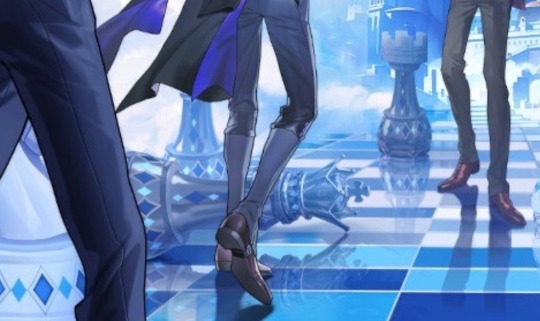
Another possibility regarding the toppled King could be that it refers to Liu Xiao's background. The fallen piece could be a resolved situation but the motivation behind Liu Xiao's intent to manipulate the timelines. Perhaps he played this game before and lost. Does Lu Guang know him or is Liu Xiao a mere stalker? Did they play this same game together or against each other?
There's a lot that can be speculated but it is hard to say what these pieces represent for now. As I said before, this read is based on popular imagery of what chess is, not on the actual strategy on the board itself. Secondly, these three new characters we have yet to meet, they don't have a defined role in the canon, not until Yingdu Chapter finally aires.
>> Tokens

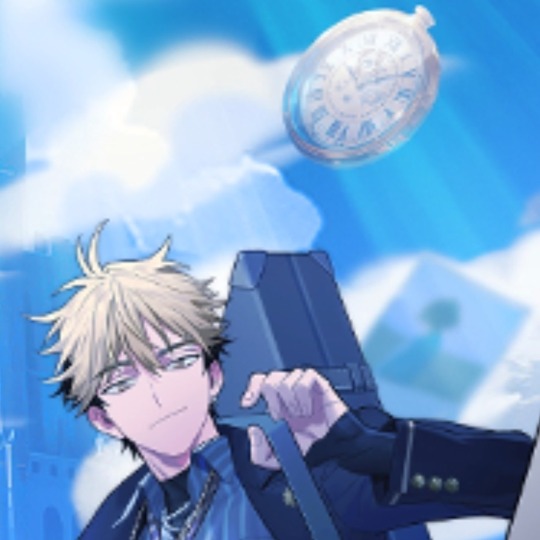
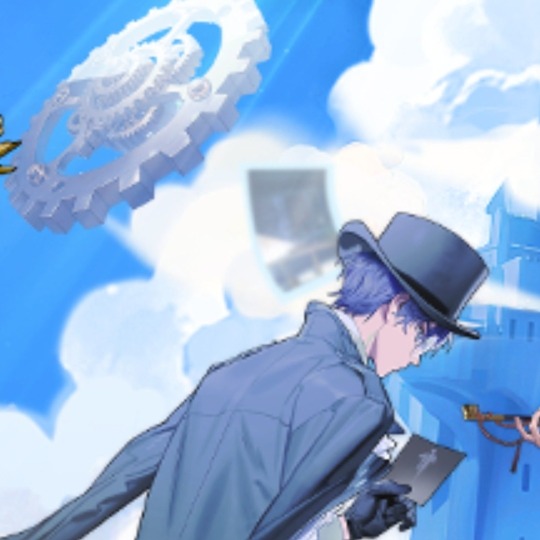
Each character is giving a object. I guess it might be relevant to the type of gameplay the AR game will offer but for the sake of this meta, we're still gonna try to understand why those in particular.
Cheng Xiaoshi has a camera. I don't think it deserve further analysis, his powers exist through the lens after all.
Xia Fei has a clock. Guess the time? 10:10. For those unaware, it is a very recurrent time. Put the promotional poster aside, I recommend you pay attention to the time on the clock in the Studio, above Lu Guang's head, right before the gang gets a ominous call from Xu Shanshan's phone at the end of 1x09. If it should mean anything about Xia Fei himself: I won't say it enough but, really: DO NOT TRUST HIM. Or, you know, perhaps he's doomed: it is worth mentioning that except for Xia Fei's Pawn ♙, each character is affiliated to a piece which can move forward and backward on the board.

Liu Xiao has a gear. I find this one intriguing because, so far, this object has belonged to Cheng Xiaoshi's imagery (cf. "BREAK!"). For someone on an ambitious project such as controlling timelines, he is giving a small tool that cannot be used on its own, is part of a machine. Could be relevant to the way he does things, never getting his own hands dirty, working through others. Or it could be that he's himself just another player, played by Fate. Or perhaps, he has the missing piece that Lu Guang needs to save Cheng Xiaoshi, who knows?
Vein is already using his own item: the pipe. He's the only one owning his object and aware of it.
>> The Case Study of Lu Guang

Because of course, our favorite character is actually the shadiest of all, I will dedicate a whole section about him specifically. Why do I insist on calling Lu Guang shady? We know and we see his chess piece is white. But you have to take a closer look to make out the White Knight ♘. The value of a Knight ♘ is equivalent to the Bishop's ♝. But ultimately, its worth less than Cheng Xiaoshi's Rook ♖.

L shaped path
Moving only in an 'L' shaped path, Knights ♘ are the most effective from the center of the board. This is because they get a broader reach in all directions from the central part.
Now, this is very important. Why should it be a mystery that Lu Guang's piece is a knight? What is a Knight ♘? The answer resides in the mechanism of his maneuver.
Part of the idea of the knight maneuver is to flank. And since the Knight is not a horse but a man on a horse, the odd maneuver reflects the knight's ability to guide the horse he's riding (to an extent). In other words, since the Knight comprises two entities (the man riding the horse), the move should sensibly consist of two parts as well, to reflect the added agility of the athletic horse. Conversely, the Knight has access to a maximum of 8 squares (as opposed to the "equal" Bishop's maximum of 13) because the horse is still an animal with a mind of its own.
Note that if you place a Knight ♘ somewhere on the margins, its efficacy will diminish exponentially. Additionally, if he only moved two squares, straight or diagonally, the Knight ♘ would always be restricted to the color squares that he started the game on.
Lu Guang being the Knight ♘ doesn't only means that he moves unconventionally. It is reflective of his duality. Perhaps, the fact he's using his power and Cheng Xiaoshi's. There is another aspect of him we could address here:
Burning Palace
youtube
For one thing, "BURNING PALACE" brings back the theme of strategy board game with the checkers this time (you see black pieces falling). It also introduce the Four Heads from playing cards. The fact they bothered to mention it implies a Fourth character.
Xia Fei: ♠
Liu Xiao: ♣
Vein: ♦
The fourth color ♥ is missing and I'm secretly convinced that it's Lu Guang's color.
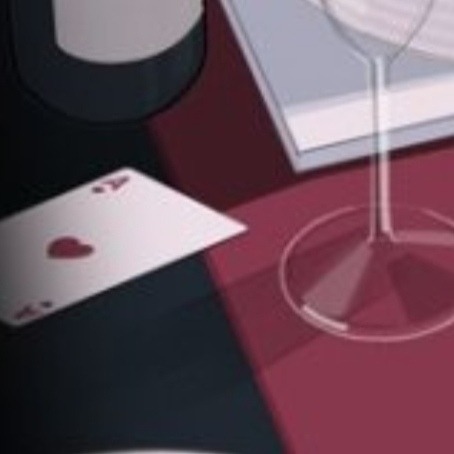
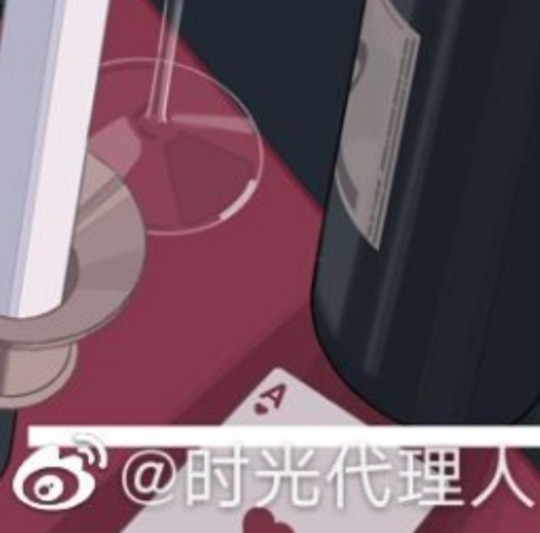
Enygmatic Tokens
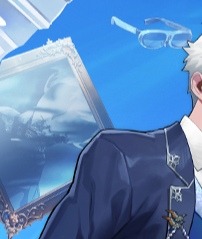
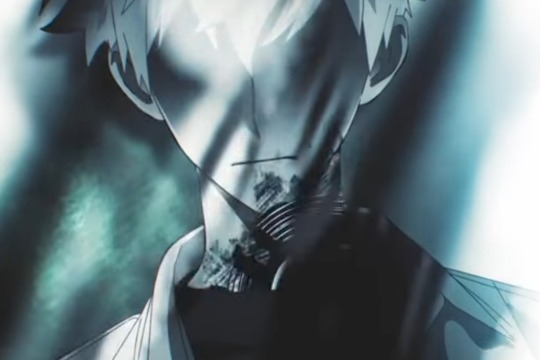
The portrait behind Lu Guang is Lu Guang himself, from "Overthink". This image appears in the first bridge, when the lyrics goes "how did my sight got stolen once more?", superposing Lu Guang's face with mysterious shapes, erasing his eyes/power. This particular line comes to confirm what we already know: Yingdu Chapter isn't a resolution, let alone a happy ending, but a repeat of a tragic event in an unchangeable node. The end is the same, once again. Lu Guang's hope and happy ending has been stolen once more. And STOLEN also implies that there is an intent behind this failure.
A portray is still a photograph though, and it can be used to dive back in time.
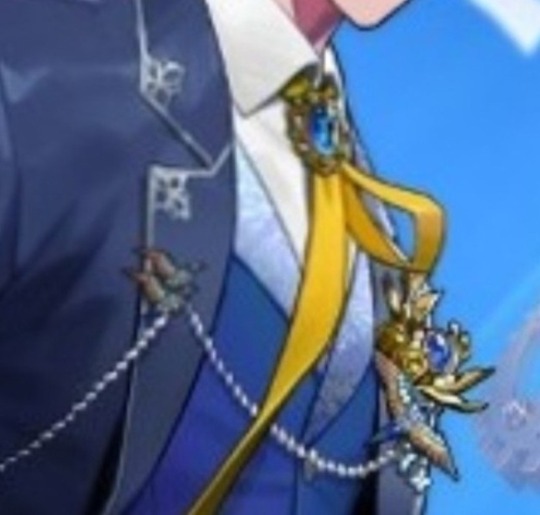
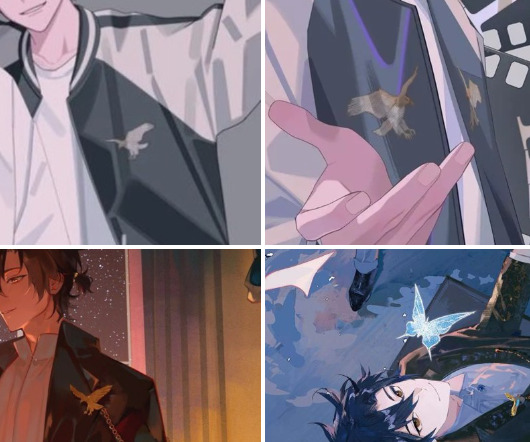
What is the most curious to me is the familiar eagle on Lu Guang's chest. Eagles belongs to Cheng Xiaoshi's imagery so why does Lu Guang is wearing them here?
An interesting take would be that Yingdu Chapter isn't actually from Lu Guang's perspective, but from Cheng Xiaoshi's, diving in a picture taken by Lu Guang. This would be some kind of plot twist and would definetely makes the big reveal easier but not less painful.
I'll probably make a whole meta about this symbol at some point but in the meantime, I'll let you know the eagle is associated with strength, power, wisdom, and freedom. The eagle's ability to soar high in the sky was believed to be a symbol of divine protection and spiritual guidance. Additionally, eagles are tied to the sun. Some people see them as signs of a bright future on the horizon. As a symbol of light, they embody both the intensity and heat of the sun as a fearsome force of nature, as well as the warmth and benevolence of the heavens.
This positive symbolisms are deeply rooted in Cheng Xiaoshi's nature, but if Yingdu Chapter actually brings us back to one earlier repeat, we can assume that Lu Guang had initially a brighter outlook on his mission.
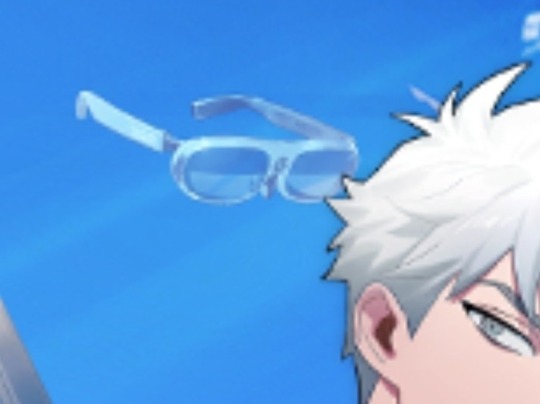


The glasses are back and I'll say it again: once is weird, twice is a coincidence and thrice it's a pattern. The portrait shows Lu Guang without eyes but his item is a pair of glasses. Might be a subtile hint of denial there. As far as glasses go, pink is a peculiar color. It helps to 'voir la vie en rose', as the french says: "look at the world through rose-coloured glasses." Meaning, being delusional.
Might it be the eagle or the glasses, I'd say they're both representative of Lu Guang's state of mind at the time: hopeful.
~
[Edit: I recommend you take a look to these threads regarding this very same artwork: | X | X | X | I don't agree with everything but it's always cool to have other perspectives.]
#link click#shiguang dailiren#时光代理人#lu guang#cheng xiaoshi#meta#liu xiao#xia fei#vein#yingdu chapter
214 notes
·
View notes
Text


As I promised, here's the 3rd 4t2 hair dump! I really really wanted all of these in my game, they're gorgeous! 🐌
Casey curls by @sleepingsims (11,857 polys, 4 colors binned, tool-tipped, animated, AF-CF);
Brittany by @aharris00britney (5,395 polys, 4 colors binned, tool-tipped, animated, AF-TF);
Viv by @sleepingsims (10,103 polys, 4 colors binned, tool-tipped, animated, AF-CF);
Rebecca by @aharris00britney (4,241 polys, 4 colors binned, tool-tipped, animated, AF-TF);
Misa v1 by @aharris00britney (13,786 polys, 4 colors binned, tool-tipped, animated, AF-CF);
Caitlyn by @aharris00britney (4,449 polys, 4 colors binned, tool-tipped, animated, AF-TF);
Enjoy, have fun and let me know if you have any issues! ♥ Some shadows appear darker in the previews 'cause of Reshade!
download (sfs) // alt download (mediafire)
724 notes
·
View notes
Text
Why do we all overlook Satan?
We all love talking about the different characters in Good Omens. But there is one person that almost never gets analysed as a character. One that even I have been overlooking for a long time, although he is essential for the very premise of the plot of the series: Satan.
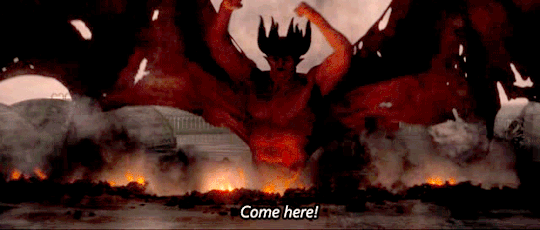
Some of the reasons why we tend not to pay much attention to Satan are quite obvious. First, he has very little screentime. He only makes one short appearance at the end of season 1 and even then is quickly sent back to hell by Adam. Another reason is that in the eyes of the viewers, including me, he does not need much character analysis. Because of our general knowledge about Western culture (no matter if we live in a Western country or not), we simply understand him to be the embodiment of evil, no further explanations needed.
And in the context of Good Omens, Satan, like God, mostly stays in the background. It is the demons who act on his behalf, while Satan himself is quite passive. But comparing Satan's and God's roles in the series and treating them both just as the alienated leaders of two opposing sides is actually imprecise. Because, as I will try to show, there are huge and important differences between them.
First, I think that Satan is one of the few characters in the series who are portrayed as utterly and unquestionably evil. Not only that all demons in hell are more or less forced to commit themselves to his evil values, but the way his character is talked about compared to others also points in that direction. Crowley definitely fears him more than anybody else. He is brave enough to stand up against Hastur, Ligur and even Beelzebub, but once Satan appears, he shouts "We are f*cked!" and wants to give up. When Job's son Ennon declares that Satan wouldn't dare to hurt him and his sisters, Crowley seems almost shocked about the implication: "I'm sorry, Satan? Satan wouldn't dare?" This gives the impression that Satan is both way more powerful and way more menacing than the average demon - a fact that is emphasized by his enormous size.
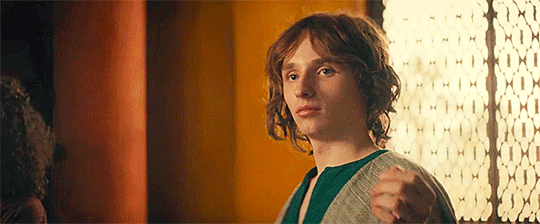
But as powerful as he is, he is still only another of God's creations. That alone makes a huge power difference between them. Satan was the angel Lucifer, who was made to serve God and then rebelled against him/her. But even in his role as the Adversary he can only act within the limits that are defined by God. In order to destroy Job's possessions, for example, he first needs a permit by the Almighty. That's why Satan depends on God in a way God does not depend on him. It goes beyond just 'good and evil need each other', because God is responsible for Satan's very existence.
And that's not the only difference between them. Satan does everything to take away people's free will. An example is the scene in which he gives Crowley his instructions about how to deliver the Antichrist (cf. this post by @vidavalor). He does not simply tell him what to do, but plants the knowledge in his head instead (illustrated by a stream of white mist flowing into Crowley's eyes). In the book, it is explicitly stated how much Crowley despises this, probably because he perceives it as a display of power, a way to remind him that he is nothing more than a tool to enact Satan's will, a tool that is not supposed to make independent choices (cf. Pratchett/Gaiman, p. 32; cited below).
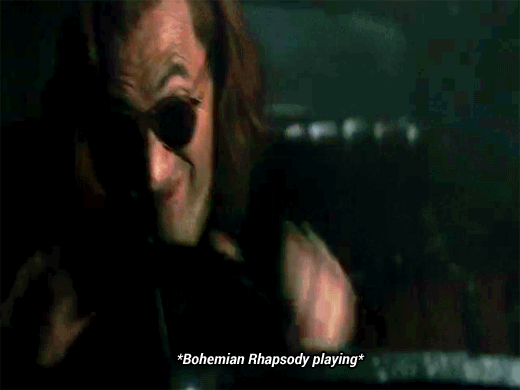
And when Adam, his son, dares to thwart his plans, he becomes furious. It is less the failed Apocalypse that angers Satan than the fact that his own son disobeyed him. Crowley knows that: "This isn't about Armageddon, this is personal!"
For God, on the other hand, there are many clues that he/she is actually very fond of the idea of people having free will, as I elaborated in this post. Him/her not reacting to the averted Apocalypse is a striking contrast to Satan's behaviour. In the book, there's also this interesting scene at the end where Crowley muses about why God, who is almighty, did not simply prevent the rebellion of Lucifer and his followers from happening. And he comes to the conclusion that this is because it is part of God's plan, too: "Anyone who could build a universe in six days isn't going to let a little thing like that happen. Unless they want it to, of course" (Pratchett/Gaiman, p. 392; cited below).
So unlike Satan, God allows his/her creations to rebel against him/her, because he/she obviously wants them to be able to choose - between obedience and disobedience, between good and evil. That's the biggest and most important difference between the two characters, in my opinion. The implications of both of their philosophies become manifest in Adam and his character arc.
At the height of his power, Adam acts like his father when he takes away his friends' free will. They protested against his plan to destroy the world, so he takes control of them, freezes them so they can't move or speak and thereby express their disagreement with him anymore, and forces them to smile. When he finally releases them again, they run away from him - and Dog follows them.
Brennan Croft (p. 156f; cited below) points out how meaningful this particular detail is. The hellhound was sent to Adam in order to carry out his will. By naming it, Adam was able to give it "its purpose, its function, its identity". And he named it 'Dog', because that's what he wanted - a companion, a real dog. Thus, the hellhound became a real dog, and through Adam training him more and more of his hellish nature was lost (cf. Brennan Croft, p. 156; cited below). And so the hellhound, whose task was to serve Adam, was in fact given free will by him. "He's not your dog, he's his own dog" Pepper shouts at Adam, and she is right - which makes it possible for Dog to turn his back on his own creator because he isn't okay with his actions anymore. As Brennan Croft writes: "Dog has developed a moral life of his own" (p. 157; cited below).

This is the turning point for Adam, who eventually realizes the wrong of his doing. His character arc serves to both illustrate how taking away people's free will causes great harm and how giving them free will is the key to solving problems and to the triumph of good (for more about this topic, see this wonderful explanation about process theology by @haemey in her reblog of my post about Crowley and God).
That means Satan is not only evil because he endorses bad deeds, but even more so because he takes away free will. I don't see how he could ever be redeemed. But since I strongly suspect that both heaven and hell will be destroyed in the finale (see this post), that leaves me with the question of what will happen to Satan. "I don't think fighting him would do any good" Crowley tells Adam in season 1, and I guess he's right. So how does Adam defeat Satan? Well, he simply decides not to accept him as his father, not to give him power over him (cf. Brennan Croft, p. 159; cited below). And maybe that's the answer. Maybe Satan will continue to exist, but it will be people's choice whether they want to give him power over them by doing evil things.
What do you think? How will the finale deal with Satan? I would love to hear your ideas!
Works cited:
Pratchett, Terry and Gaiman, Neil: Good Omens. The Nice and Accurate Prophecies of Agnes Nutter, Witch. London 2011.
Brennan Croft, Janet: Adam's Task. Naming and Sub-creation in Good Omens. In: Giannini, Erin and Taylor, Amanda (Eds.): Deciphering Good Omens. Nice and Accurate Essays on the Novel and Television Series, pp. 151-162.
47 notes
·
View notes
Text
On Humanity, Tenets and Convictions
The V5 corebook does an appalling job of explaining how these mechanics fit together and what they represent; I don't think even the Players' Guide really hits it in the terms that are needed. I don't want to jack the excellent post by @vixensdungeon but nevertheless, the urge to explain things on Tumblr dot Com, the App and Website, is very strong in me this morning.
Humanity itself is objective. Each notch on the scale has defined, concrete mechanical impact on what the character can and cannot do, and these are consistent no matter what the character thinks or believes or feels, and these are universally applicable, no matter who your character and my character and her character might be. At one end of the scale your character is Literally Unplayable; at the other, they are more human than most humans, certainly than most RPG protagonists, and might as well be unplayable considering the role of the TTRPG as societally unacceptable behaviour simulator (cf. Power Kill, as usual).
Tenets are subjective but shared. They are the ethical rules on which our story operates: the things that we have agreed should provoke a moral crisis in our vampire protagonists. For Humanity loss to occur, you need these cues and triggers, these "thou shalt not" rules, and for that central fact of the game - that unlife isn't life and living it makes you less of a person - to come up in play, they need to be rules your character is going to break.
Without Tenets you have no idea what makes Humanity vulnerable and precious and worth saving; there are not many universal, objective, "doing this always gives you a Stain" rules in V5. You have to do the work here. The game needs you to decide what's horrific in order for its personal and political horror to exist at all. You cannot skip this. You cannot rely on a universal morality that isn't there and isn't shared to dictate Humanity loss. The game needs you to think about these things.
Convictions are subjective, and entirely personal. They are the "but thou must!" imperatives which allow your character (and only your character) to justify breaking the Tenets and retain a grip on their Humanity. They create the opportunity for your character to resolve their moral and ethical qualms in their own favour every so often; to stop the process of play being a nihilistic rush down the Humanity scale. VtM works if you all speedrun down to Humanity 4 and act like the usual "chaotic evil until proven otherwise" TTRPG protagonists but it aspires to make you think and feel things about that and the rules are set up to demand you meet that aspiration.
If you want a vampire game where the state of being a vampire isn't a moral issue, can I recommend Vampire: the Requiem Second Edition? A game with an objective, universal definition of Humanity and the threats to it as "experiences that remind you you are not a human being any more," and the more fundamental that reality check is, the less likely it is a character will retain Humanity when confronted with it? It's extremely tidy and doesn't demand that you establish and interrogate any of your own principles. It's not moral "degeneration," it's experiential "detachment," and that hits very differently.
Also, none of this is to do with Lines and Veils. Tenets are rules you want your characters to break. They are the substance of your morality play. They will come up in play and they will do so often. Lines and Veils are rules about what you as a player do not want to have to experience at the gaming table and they are not supposed to come up/be directly narrated. One of these things is part of a core gameplay function and one is a safety tool. Know the difference.
71 notes
·
View notes
Text
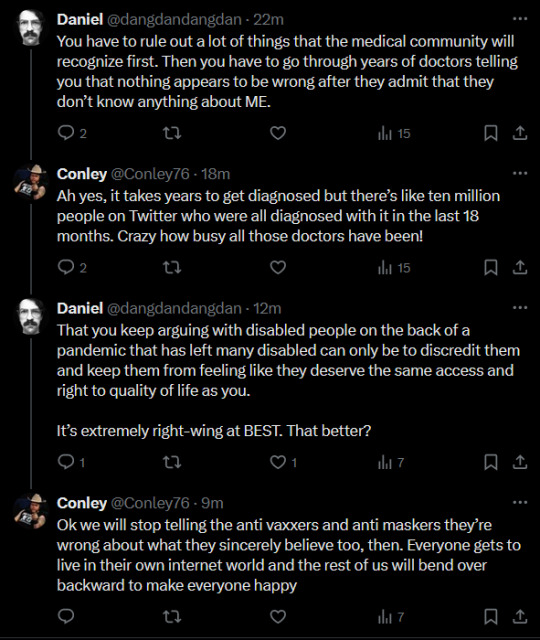
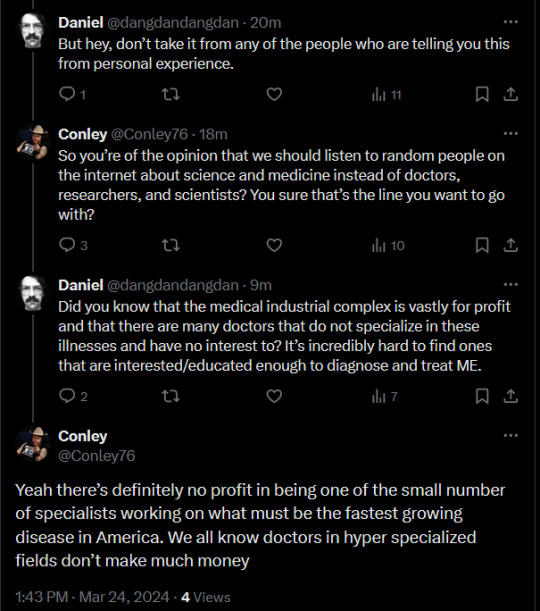
Possibly the biggest piece of shit out there. It's amazing how these dense motherfuckers have absolute zero fucking base of knowledge on what they're talking about but still run their mouths.

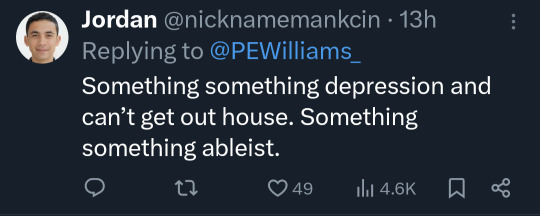
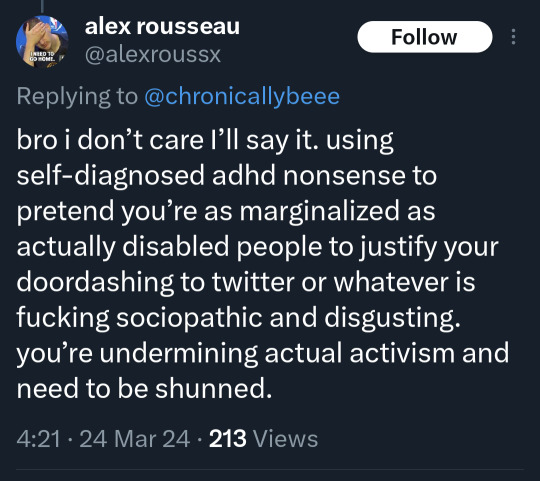


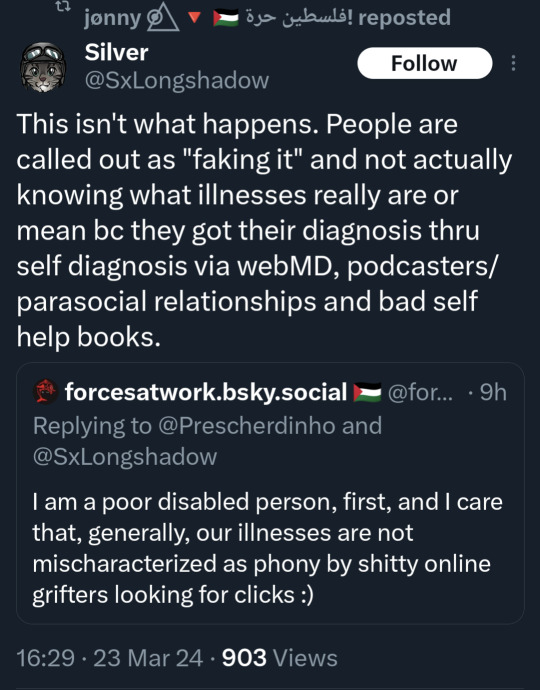


And it's still fucking going, this is what, day four of this now? It's so fucking obvious that none of these so-called "leftists" have no fucking clue what they're talking about. And once again, someone likening ME/CFS to Morgellons because all these asshole motherfuckers are all lacking in anything approaching empathy.
And fuck this piece of shit in particular.


#disability#leftist ableism#me/cfs#i'd like to tell you want i want to do this motherfucker but that would be against TOS nevertheless it involves power tools
21 notes
·
View notes
Text
SOTR would have landed better if the victors we met weren't ones we already knew
(in! my! opinion!)
First off, I enjoyed the book, but I don't think it's without its flaws. My biggest issue with it is that there were too many characters that we already knew and they were all too close to the plot/Haymitch (do not get me started on him being besties w Burdock...)
My biggest issue with this was with Wiress, Beetee and Mags being included. We didn't need to see the details of how the three of them have defied the capitol, we already know! We can assume Wiress and Beetee being drawn in CF was because of their attitudes towards the games and the Capitol. Even if we don't know the details of their rebellions, we know how they feel. Mags is a bit different since she volunteered for Annie, but I think that act (along with her sacrificing her life) show her greatest strengths— protecting kids from the games. We already know this! We didn't need to see it!!!!! To me their inclusions felt as more of telling the ways they rebelled, rather than the showing that happened in CF and Mockingjay.
I also think it was a missed opportunity to introduce new victors (or expand on ones we didn't know as well from CF). Suzanne Collins writes such complex characters and people grow attached to them easily (hence why Haymitch got his own book..). I was way more interested in characters like Louella and Wyatt, who we had no prior connection/knowledge of. (also Maysilee, but idk which group she would be. She's not 100% new, but we only have a handful of vague references to her from the original trilogy)
Lastly, I think it narrows the complexity of the rebellion, and maybe the books overall. I've seen more than one person say that part of the point of SOTR was to show that the rebellion was a slow process, and Katniss was just the right tool at the right time. and. Yeah? again, don't we already know this? I felt this was obvious from the ways Coin and the other leaders discussed the importance of acting while they had the upper hand (also, doesn't Plutarch outright say it? I can't remember the specifics). Including Wiress, Beetee, and Mags makes it seem... Less of an ongoing thing (IDK how to word this :| ). We can now trace THREE victors that we ALREADY KNEW to ONE incident. And by the end of the novel, the three of them seem very close to how we meet them in CF. so...... what happens in the 25 years between them? the three of them are probably not involved in any more major incidents (I don't think Snow would have let more than one fly without killing them). so... did the rebellion just stay low for 25 years? I doubt it! but I also don't know what to think. To me, It would have made more sense for the events of SOTR to play out with new victors, leaving it up to our imaginations what happens with the ones we already knew.
Obviously, this is all MY! opinion so feel free to disagree
#I dont think i will ever be convinced that these three HAD to be in the book#tbh i was really let down by the amount of characters that were in the book#I understand wanting to allude to and reference characters from the other ones but im sorry. there were too many.#imo we could have done without the 3 victors#but we didn't need to be all up in their business#sunrise on the reaping spoilers#haymitch abernathy#thg#thg sotr#sotr#sunrise on the reaping
24 notes
·
View notes
Text

Help Us Move Out!
Hi! We're a trans, queer, disabled, plural system living with DID, ME/CFS, and chronic pain, and we're currently in dire need of funds to leave a deeply painful and triggering situation that we're in.
Long story short, we're currently processing 5 years worth of relationship trauma along with a difficult breakup, which has put us in a position where we desperate need to escape from the house that we're living in and move to somewhere safer for us to be. We're still living with our partner who caused all this harm due to our disabilities and struggles to get a job, and we've been given a deadline of the end of the year to move out before we'll be forced to move in with family- another extremely triggering situation for us, and a home that has contributed to worsening our disabilities in the past.
We're in need of any kind of support, be it sharing our story, donating a few bucks, or even commissioning us! Any little bit helps and is very very appreciated ❤️💙💜
If you'd like to help outside of the GFM, consider joining our Patreon, donating to us on Ko-Fi, or commissioning us for some art! We make lots of Discord bots and tools for plural folks, and we'd love to be able to create things full time instead of hurting ourselves by getting a standard job. As said before, any little bit helps!!
#mutual aid#mutualaid#gofundme#go fund me#gfm#trans#queer#chronic fatigue#chronically ill#idk how to tag this tbh we don't really do this often :'3#patreon#ko-fi#kofi#art#digital art#commissions#commissions open#positively plural#multiple made media#actually autistic#actually borderline#<- other things not mentioned directly but stuff we still struggle with
23 notes
·
View notes
Text
Calling All Beings to Send Love and Peace: A Message for Our Community
Harnessing Inner Peace: A Pacing Toolkit Tool for Those Living with ME/CFS or Long Covid As we face the approach of Hurricane Milton, we are reminded of the moment when Jesus calmed the storm on the Sea of Galilee. His disciples, filled with fear, watched as He spoke these simple yet powerful words: “Peace! Be still!” And the storm settled. This is such a time for us to look at the storm that’s…
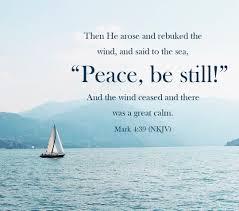
View On WordPress
#biblical inspiration#Calming techniques#chronic fatigue syndrome#emotional wellbeing#faith-based healing#healing tools#hurricane anxiety#hurricane preparedness#Inner peace#Jesus calms the storm#Long Covid#ME/CFS#meditation for chronic illness#mental health#Mindfulness#Orgyen Chowang#pacing techniques#PEM management#post-exertional malaise#Post-Viral fatigue#pristine mind meditation#resilience in chronic illness#restful awareness#spiritual growth#Spiritual healing#storm metaphors#stress reduction
0 notes
Text
Rafayel, Portrait of a God
Author's note: This is my first post about Love And Deepspace and also the very first analysis of one of the LI I have ever written. It is quite long and very detailed. The shorter version can be found on my Instagram. Feel free to have a look and let me know what you think of it (especially regarding the theories mentioned) and if you want other analysis :)

Because of his eccentricity and unapologetically flamboyant, diva-like flair, Infold arguably makes Rafayel the most amusing ‘love interest’ in LADS. However, his humor isn’t mere comic relief—it evokes the personalities of Greco-Roman gods. This analysis will delve into the parallels between Rafayel and ancient gods, in order to unravel the complexity of his character and possibly speculate on the future direction of LADS.
1/ The archetype of an Olympian
Despite their differences, the Olympian gods share some core personality traits: huge pride and ego (hubris), extreme passion and intensity, impulsivity, very creative vindictiveness and long-lasting grudges and of course their tendency to get involved in human affairs often using deception.
Those traits can be found in Rafayel’s personality.
a) The consequence of the divine pedestal : pride and loneliness.
Rafayel’s personality is marked by arrogance, self-confidence, and narcissism. He frequently boasts about his “dashingly good looks” and seems to carry a god complex—or at the very least, a deep sense of superiority. He despises being laughed at, readily critiques human behavior, and is quick to point out others’ flaws, including MC’s. Notably, he consistently refers to others as “humans” rather than “people,” subtly rejecting any sense of shared identity with them, even though he lives among them.
Although he is Lemurian and expresses affection for his homeland and people, Rafayel never quite fits in. After meeting MC, he begins to view the deep sea as “a prison” (cf: Night Stroll), and his aunt Talia observes that he tends to “drift in and out of people’s lives,” always ready “to disappear without a trace” (cf: Video Call - My Anchor). This sense of detachment may stem from the way Lemurians revere him—as a deity. Their idolatry has always isolated him, creating in him a deep sense of loneliness. Rafayel often confesses to feeling lonely, underscoring the isolation that comes with the pedestal he’s been placed on. He views his divine status as a burden and never really embraces it. He even rejects it by refusing to sacrifice MC in Forgotten Sea and even denies the existence of gods in Ivory Nightfall. It’s as if he wishes to be just Rafayel (the way MC sees him, hence why he feels good in her presence). He perfectly embodies the expression “it’s lonely at the top”, the top being where the gods resides.
b) Deceptive nature: a tool to get involved in human affairs.
Despite his disdain for humans, Rafayel frequently involves himself in human affairs—whether out of curiosity or for personal benefit. As a child, he left the ocean in search of something less monotonous than the deep sea, only to end up stranded on a beach due to his reckless curiosity. Later, echoing the Olympian gods who often used metamorphosis to walk among mortals—and sometimes to seduce them—Rafayel adopted various disguises. For instance, he wore a mask to attend the Sea God ceremony in the surface world in Forgotten Sea, pretended to be an illegitmate nephew / opera singer at a masquerade ball in Land of Secret Flames and eventually found a way to pose as a university professor at the university where the MC studied (cf: his anecdotes). Plus, like the gods of myth, Rafayel keeps a watchful eye on the MC, observing from a distance much like the divine beings who monitored the lives of mortals.
Furthermore, Rafayel exhibits a distinctly deceptive and manipulative streak. He lies with ease, finds joy in pretending and acting, and remains a deeply enigmatic figure—it’s difficult to tell where the performance ends and the truth begins. In Omnipotent Perception, he declares, “She (MC) doesn’t understand me. She thinks she does but …”—a statement that creates doubt about the authenticity of the persona he presents to MC. It suggests that much of what he reveals might be carefully constructed, a mask concealing his true self and blurring the line between illusion and reality. Flamboyant and theatrical, Rafayel often reacts with exaggerated drama to trivial events, portraying himself as fragile, helpless, and in distress—when in truth, he is anything but. Beneath the performance lies a being who can be cold, calculating, and extremely dangerous. His Evol is fire—one of the most destructive forces on Earth. He doesn't need a “miss bodyguard” to save him; on the contrary, he’s fully capable of unleashing devastating power on his own.
c) The embodiment of divine retribution
This brings us to Rafayel’s darker, more vengeful side. Like any Olympian god, he can be merciless and creative in his pursuit of retribution, with a form of revenge so intricate and almost supernatural that it could be described as “divine retribution.” As the God of the Lemurians, he feels entitled to their protection. As he says in Ivory Nightfall, “If there really are gods in this world… they should help people live happier lives.” When his people are in need, he is there for them; when they are persecuted—or worse, killed—he uses every ounce of his power to make those responsible suffer. In the current timeline, Rafayel goes so far as to murder Raymond by using his own art after discovering that Raymond owns a Lemurian skeleton in a tank. In the Sea of Golden Sand myth, Rafayel vows to bring back Lemuria and schemes to get MC’s heart to achieve his goal (hopefully for her, he changes his plan). Rafayel also holds onto long grudges. He has never truly forgiven MC for forgetting him and failing to return to him as promised when they were young. His resentment is also encapsulated in the infamous line, “It’s been 800 years… and finally, you remembered me!”
d) I shall do what I want!
Let’s not forget that Rafayel has little regard for rules. He’s the only love interest who cheats during Kitty Cards—a playful yet telling example of his disdain for structure. Rules are to discipline humans, not gods who are known to be impulsive. They do what they want regardless of the consequences. Rafayel is guided solely by his own whims. Impulsive and headstrong, he follows his heart rather than logic. In Ivory Nightfall, he initially refuses to repair the damaged statues, unmoved by the townspeople’s desperate pleas. His swift dismissal mirrors a god’s indifference to unanswered prayers—he hears you, but he doesn’t care because and what he thinks should be will be.
e) A figure of worship
Like a deity, Rafayel is worshipped—both in his myth and in the current timeline. Whether as a god or an artist, he is constantly praised. In ancient stories, he is revered as a God; in the modern world, he is an extremely famous and admired artist followed by paparazzi and fans. His art is also worth millions.
f) A divine passion and intensity
Speaking of art, Rafayel’s creations are a direct reflection of his emotions. As he puts it in When Light Falls, “Colors have emotions.” For him, “love and art are intertwined”, and in Intertidal Zone, he reveals, “I thought only pain could bring me inspiration.” Therefore it is obvious that Rafayel’s art is born from the depths of his feelings, and when it comes to emotions, he always feels intensely and deeply. This is why his Evol is such a perfect representation of him. Like an Olympian god, he is driven by passion, with no emotional middle ground. He fully embraces his emotions, even when they threaten to consume him (cf: Intertidal Zone, “Even if (…) they burn me instead, I still want them with every fiber of my being.”) When Rafayel feels melancholic, it’s not a fleeting mood, he grieves; when he hates, his vengeance can be more brutalthan anyone could imagine—making your death a traumatic event. And when he loves, he does so with an intensity that could lead him to sacrifice everything, himself and even the fate of Lemuria, for the one he loves. He is a deeply devoted lover, and when his devotion isn’t reciprocated in the way he expects, or when he feels he isn’t his lover’s priority, his frustration becomes palpable.
2/ Resembling Poseidon ...
A major god in Ancient Greek mythology, Poseidon is best known as the god of the sea, but he also holds dominion over earthquakes and natural forces. His deep connection to the ocean makes him an evident mythological parallel for Rafayel, the god of the sea and tides in LADS.
a/ Ethymology
Interestingly, the etymology of Poseidon's name —potei meaning “husband” and da meaning “earth”—can be interpreted as “Husband of the Earth,” a reference to his ability to shake the ground and stir nature’s most powerful elements. While this might seem like a stretch at first glance, LADS appears to intentionally weave this symbolism into its narrative. Rafayel is deeply in love with the MC, and they are portrayed as bound by an eternal connection like a husband and his “beloved bride”. Moreover, the MC was involved in the Gaia research project as a child—Gaia being the personification of Earth in Greek mythology. This subtle link reinforces the idea of Rafayel as a Poseidon-like figure who is not only tied to the sea but also bound to the Earth through his connection to the MC. We can now explore the more obvious parallels between Poseidon and Rafayel.
b) Poseidon v. Zeus / Rafayel v. Astra ?
In Greek mythology, Poseidon is the brother of Zeus. He was granted dominion over the seas while still subject to his brother’s ultimate authority. A similar hierarchy appears to be at play in LADS, where we are introduced to two divine figures: Rafayel, the God of the Sea, and Astra. Though Astra’s exact domain remains unclear, his portrayal suggests an overwhelming power—greater even than Rafayel’s current power. He exudes a sense of omnipotence, with the ability to control fates and impose divine punishment on those who merely disobeys him without even appearing. Much like Zeus, Astra appears to occupy the highest position in the divine hierarchy, and his name—derived from the Greek astron, meaning “celestial body”—further hints at his possible identity as the God of the Sky, Zeus’ domain. A rivalry between him and Rafayel is suggested by the ominous reference to “a fierce battle between the sky and the ocean” in the climax of Land of the Secret Flames. If we follow the theory that links Astra to Ever, this rivalry between the two gods is already present in the current timeline. Ever placed a bounty on Rafayel due to the fact he murdered members of the company. Plus, in Land of the Secret Flames, Ever’s presence on an island that was once the place holding Lemuria’s Temple provokes Rafayel. He’s acutely aware that Ever (that he explicitly calls ‘his enemies’) seeks something that does not belong to them— an Aether Core (or perhaps the Tome of the Sea God?)— in a place where they should not be and he refuses to allow it. This confrontation is what drives Rafayel to fully awaken his divine power. In a chilling display of wrath, he enters “God Mode” by absorbing the power within the tome, and mercilessly drowns the intruders in the blue hole—divine retribution carried out with unsettling ease. Lemuria is the Sea God’s domain, and Rafayel makes it clear: Ever, or Astra—the Sky God—has no place there. (We’ll return to Astra and his mythological implications in a separate analysis.)
c) Failure to protect cities
Poseidon is also remembered for his repeated failures to become the protector of cities and, more significantly, for his role in the destruction of Atlantis—the legendary sunken island that clearly inspired Lemuria in LADS. This mythological aspect aligns closely with Rafayel’s own story: he ultimately fails to protect Lemuria, becoming responsible for its downfall. Poseidon also appears frequently in myths centered around vengeance, a trait we’ve already identified in Rafayel. Like the sea god, Rafayel’s anger is poetic yet merciless—his retribution as devastating as it is symbolic.
d) Same places and methods of worship
Moreover, Poseidon was widely worshipped, with temples often built in remote, sea-facing locations—on cliffs, islands, or near the shore—reflecting his dominion over the ocean. This mirrors the worship depicted in the Forgotten Sea myth, where a temple perched on a cliff serves as the center of reverence for the Sea God. Coastal communities celebrate him with statues, festivals, offerings, and even sacrifices. In the present timeline, Rafayel’s Mo Studio echoes this sacred architecture: situated on the beach, crowned by a bell tower reminiscent of a chapel.
e) The true powers of a god of the sea
Now moving on to Poseidon’s powers—he is famously known for commanding storms, causing earthquakes, and unleashing the full force of the sea. Interestingly, while this is only my theory, there are numerous instances throughout LADS that suggest Rafayel’s emotions may be directly tied to the weather, echoing Poseidon’s elemental influence. When Rafayel’s godhood awakens in Land of the Secret Flames, the sea grows restless and a storm starts to gather—nature itself responding to his divine presence. Even in quieter, more emotional moments, weather shifts seem to mirror Rafayel’s internal state. For example, in Ocean at Night, the wind appears to behave almost as an extension of Rafayel’s mood. When he resists the idea of going to watch the lanterns with MC, the wind lashes out. But as his demeanor softens and he begins to feel joy, the wind mysteriously calms, as though attuned to his emotions. In Myths and Omnipotent Perception, Rafayel’s connection to the rain becomes even more apparent. In Myths, rain begins to fall unexpectedly, and Rafayel casually remarks, “Whoops, didn’t expect it to fall so quickly,” weirdly implying he may have inadvertently triggered it. He embraces the downpour with childlike delight, splashing through puddles and confessing he’d “always wanted to do this.” In Omnipotent Perception, the sky is initially clear and the forecast promises sunshine—yet when MC pushes Rafayel to open up about his pain and isolation, the weather abruptly turns. Rain begins to pour, thunder rolls overhead, and the storm intensifies with his emotional vulnerability. Later, when MC initiates a more intimate moment in the bathtub, the storm rages again—only to gradually subside once their passion is spent, as if his volatile emotions have been soothed. Finally, in Ivory Nightfall, Rafayel’s connection to natural disasters is brought to the forefront when he arrives in the aftermath of a tsunami—a catastrophe born of the sea itself—suggesting not only his domain over the waters but a divine responsibility in moments of crisis. This elemental harmony between Rafayel’s emotions and nature reinforces his mythic parallel with Poseidon, portraying him as not just a god of water, but a force of nature whose heart can quite literally change the weather.
f) Marine attributes
In terms of attributes, Poseidon is famously described by Aristophanes as “the mighty master of the trident, the fierce shaker of earth and sea.” He is often portrayed wielding a trident and surrounded by sea creatures—dolphins, fish, sea monsters, and Nereids—all symbolic of his absolute dominion over the ocean.
In LADS, while Rafayel doesn’t physically wield a trident in the current timeline, it is referenced in Deep Sea Promise. The quote “Cumbersome. I dislike it,” suggests that Rafayel once possessed a trident but rejected it—possibly due to its symbolism or the burden of divine responsibility.
Much like Poseidon, Rafayel is constantly surrounded by marine life. These companions range from fantastical beings like the Lemurians (mermaids) to actual sea creatures such as fish, whales, sharks, and even sea monsters. In the Forgotten Sea myth, he parades with them during the ceremony like a sovereign god. He also actively interacts with them, ordering fishes to race alongside MC or communicating with whales as though speaking to kin.
Additionally, Rafayel’s ability to manifest fish illusions further illustrates his mystical connection to marine life. These illusions are not just playful tricks; they carry emotional weight, particularly the fish that represents his long-standing promise to the MC. And then, of course, there’s Reddie, his and MC’s small yet meaningful fish companion.
3/ … while being very Apollo
a) Ethymology and epithets ; the image of the Sun
By studying the etymology of names and Apollo’s epithets, we can trace compelling parallels between the Greek God and Rafayel. The name Rafayel clearly draws from the Hebrew רְפָאֵל (Rafa’el), meaning “God heals” (refa – “to heal,” and El – “God”). Healing is one of Apollo’s central divine functions. But this god can also bring destructionwhen angered. This destructive aspect is symbolized through Rafayel’s evol, fire, which he references repeatedly in battle with lines like: “Creation and destruction go hand in hand,” and “Everything will turn to ashes.” Furthermore, Apollo’s epithet φοῖϐος (Phoibos) — from which his Latin name Phoebus derives — means “bright” or “radiant.” It was often used by poets as a synonym for the sun. The sun plays an important role in the Forgotten Sea myth. Not only it is the theme of conversation the Temple’s Sunsetmemory but it is also the “symbolic of Lemuria as a whole”. Known as the Sun Below the Waves, this sun is a divine flame, creation of the Sea God and it is the source of Lemuria’s prosperity and protection. As revealed in the Tome of the Sea God, this “ancient flame has burned in Whalefall City’s temple for thousands of years” and is tightly linked to the Sea God’s life. If the flame dies, so does the Sea God (and vice versa)—and with him, Lemuria. The bond is cyclical, sacred, and irrevocably divine. This solar flame, much like Apollo’s radiant presence, represents not just light and fire, but knowledge, vitality, and divine illumination—all elements necessary to sustain civilization and consciousness. And who are the two gods that represent them: Appolo in Greek Mythology and Rafayel in LADS.
b) An artist god
Apollo is also known as the god of the arts, particularly of music, a divine function that finds clear echoes in Rafayel’s character. Renowned for his talent in painting, photography, and music, Rafayel mirrors Apollo’s artistic brilliance and creativity. In classical depictions, Apollo is often shown surrounded by the Nine Muses, daughters of Zeus and goddesses who preside over the liberal arts and inspire artistic creation. In LADS, this role of muse is embodied by MC, who frequently inspires Rafayel. Whether it’s a painting sparked by a shared moment or a song, MC consistently fuels Rafayel’s creativity. Additionally, Apollo is traditionally represented holding a lyre. While Rafayel is never directly seen with a lyre in LADS, we see him play various musical instruments—a flute, a harmonica—which reinforces his connection to the divine realm of music. Interestingly, the lyre itself is mentioned in the Forgotten Sea myth as the instrument played during the surface-world festival honoring the Sea God. Though subtle, this reference places the lyre within Rafayel’s mythos, further deepening the parallel between him and Apollo.
c) Similar personality and tragic love stories
Personality-wise, Rafayel and Apollo share striking similarities. Both are proud, confident, intelligent, and capable of deep vengeance when wronged. In appearance, too, they reflect the archetype of idealized male beauty—youthful, slender yet athletic, adorned with delicate features and a luminous presence.
Another poignant parallel between them lies in their tragic experiences with love. Despite his charm, Apollo is notoriously unlucky in romance. Many of his relationships end in heartbreak or death, and he frequently falls in love with mortals or nymphs rather than fellow deities. This mirrors Rafayel’s doomed yet passionate bond with MC—a star-crossed love story between a Lemurian god and a human.
d) The role of prophecies
Moreover, Apollo is the god of prophecy, associated with the Oracle of Delphi and the sacred Pythia who channeled his divine foresight. Prophecy plays a central role in Rafayel’s myths and his relationship with MC. The Tome of the SeaGod, an ancient divine artifact, contains visions of Lemuria’s fall and potential rebirth. A new prophecy appears after each reincarnation of the Sea God. For instance, it stated that Rafayel would be the last god of the sea. But, not only the tome foretells events but it also contains the power of the Sea God. After absorbing the power within the tome and thus inherited the Sea God’s full powers in Land of Secret Flames, we can wonder if Rafayel has inherited the gift of prophecy. If so, this would place him on equal footing with Astra—or any other god-like 6th love interest—shaping him not just as a god of sea and art, but one of divine knowledge and fate.
25 notes
·
View notes
Text
This is your sign to get That Thing that you've thought would be useful for a long time, but didn't think you should get it for whatever reason. This is the sign to get that thing.
I bought a shower chair, a phone holder for the shower, and a powered scrubber. And my life is forever changed.
Context: I've been pretty open about how, for the past year or so, I've been increasingly struggling with bathing. I used to shower roughly every other day, and gradually that became about once a week, and then further, and then to the point where I genuinely don't know how often I've been bathing. It's just been deodorant and dry shampoo for a long, long time.
This is because I have Chronic Fatigue Syndrome (CFS) and dissociative issues. Everything way is way more mentally and physically taxing with CFS, and the dissociation makes it doubly hard to focus. My phone would be blasting some video outside the shower to keep me present, but afterwards I'd still be exhausted for at least the rest of the day.
I got around the problem a little by taking "spit baths" or "bird baths", basically washing the important parts in the sink. Then I'd use deodorant for the rest (which, as long as I semi-regularly changed my clothes, went well /gen). I went a long time using primarily these methods, as it uses overall less energy than a full shower.
But smelling good and being basically hygienic ≠ feeling clean. I was getting the important parts, but I only ever feel clean when I've thoroughly showered.
So. After a great deal of consideration, I decided to get a shower chair and a water-resistant phone holder, and while I was on the webpage, I saw a neat powered body scrubber thingy I've always wanted, and ordered it in the spur of the moment. The phone holder arrived yesterday, the chair and scrubber today.
I've included some reference pictures for anyone who doesn't know what I'm talking about



And today, I finally took a shower with all the little things I've wanted. The phone holder and the shower chair and the electric scrubber thingy and. Holy shit. I feel better after this shower than any shower I've had in well over a year. Maybe even two years at this point.
It was a little awkward at first, I'm not used to sitting in the shower, but once I got used to everything it was an overall amazing experience.
I actually started laughing at some point, because all those things I've wanted, but for some reason had been afraid of getting, made it so much easier that it felt absurd and delightful and I enjoyed bathing for once!!
Once the shower was over, I grabbed the towel and sat on the shower chair to dry, something new for me. And, once I got out, I immediately got changed into fresh clothes instead of spending hours laying in bed recuperating.
I went and made myself dinner just now!!! Granted, it was just microwave baked beans, but I can never cook after bathing!!!
Anyway I'm sitting here drying and cozy in my usual Warm Things and feeling very, very happy about my purchases.
The moral of this story is that if you have the ability to get something that you suspect will make your life easier, get it.
It doesn't matter whether you're sick or not, it doesn't matter if you're diagnosed, it doesn't matter if you can technically get by without it. It doesn't matter if the thing is for "old people" and you're young, it doesn't matter if it's for disabled people and you're not sure if you "count" because you "only have" [the mental or physical issue that's affecting you].
Get the fucking thing. If it will make your life better, you should get it. It won't be a waste of money if it makes you less miserable, whatever it is.
Do not deny yourself the tools you need to live comfortably and happily.
You have my permission and my endorsement, if that means anything to you.
Xxx. Pansy
P.s. stay tuned because I'll be getting a powered wheelchair or scooter in the coming months. The moment I figure out how to do it, I will. I should have gotten one when I was first diagnosed but I didn't. I will not be repeating my past mistakes and denying myself the tools I need to live comfortably and happily.
#disabled#disability#cripplepunk#chronic fatigue syndrome#chronic illness#chronically ill#chronic fatigue#cfs/me#cfs (chronic fatigue syndrome)#pansy speaks#pansy talk#pansy stuff
126 notes
·
View notes